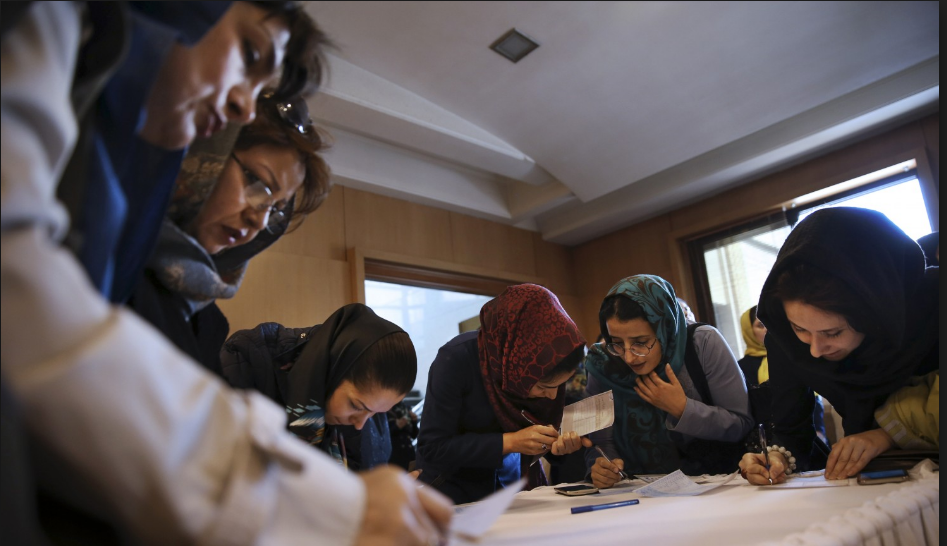Death penalty expert Tahar Boumedra has in an op-ed for the International Business Times urged Western governments to support a United Nations probe into the 1988 mass execution of political prisoners in Iran. The following is the full text of the op-ed that appeared in the IBTimes:
International Business Times
Iran elections: The West must stand with Iranians against their abusive regime
The regime in Iran is among the worst human rights abusers in the world.
By Tahar Boumedra
The world is watching on as Iran plans to hold its presidential elections in less than six weeks, but it’s important to look at its consequences through the prism of human rights.
While critics point out, correctly, that an election whereby all candidates must prove their loyalty in heart and deed to the Supreme Leader, and are filtered stringently by a Guardian Council whose members are themselves appointed by the Supreme Leader, can hardly be considered to represent the free will of the nation, the prospective choice of candidates offered to the Iranian people is itself a stark indicator of the fate that Iranians are expected to face.
One expected candidate is current President Hassan Rouhani, who though billing himself as a ‘moderate’ in the 2013 election, has, according to a report last year by the UN Special Rapporteur on the human rights situation in Iran, presided over the highest rate of executions in the country in the past quarter of a century.
Iran under Rouhani has appeared in Amnesty International’s annual reports as having the highest number of executions per capita the world over. And on 20 April, 2014, Rouhani described executions as the enforcement of “God’s commandments” and “laws of the parliament that belongs to the people”.
Under his watch, the authorities torture and arbitrarily imprison opponents, discriminate against women and carry out public floggings, eye-gouging, amputations, and hangings as means of terrorising the population into docile submission.
Rouhani’s main contender for the presidency is Ebrahim Raisi, with a sinister record of his own. Currently, the cleric Raisi heads the country’s largest economic conglomerate and is a member of the Governing Board of the Assembly of Experts. A former deputy head of the judiciary, Raisi is most notorious for his role in the 1988 massacre of thousands of political prisoners.
That massacre, which has been described by international human rights jurists as an unpunished “crime against humanity”, began at the end of the Iran-Iraq war when Ayatollah Khomeini issued a fatwa, or religious decree, ordering the execution of all political prisoners who continued to support the main opposition group People’s Mojahedin Organisation of Iran (PMOI or MEK).
Death committees, comprising a religious judge, a representative of the Intelligence Ministry and a prosecutor, were formed in towns across the country and held hasty ‘trials’ for prisoners, lasting no more than a few minutes. Prisoners were posed a simple question of where their loyalty continued to lie, and a ‘wrong’ answer meant immediate execution, regardless of the fact that the victims were already serving sentences handed down by the regime’s courts.
Within weeks, according to survivors and defectors within the regime, more than 30,000 political prisoners were exterminated.
Raisi, as deputy prosecutor of Tehran, sat on the majority of the death committee sessions in the capital, and has been identified by numerous survivors as a key decision maker in ordering each of the executions. He was also named by Khomeini’s former deputy, Ayatollah Hossein-Ali Montazeri, who broke with the regime and published the text of Khomeini’s hand-written fatwa in his memoirs.
Calls from victims’ families for international prosecution of the perpetrators of the mass executions of 1988 have grown since last summer when Montazeri’s relatives published an audio file of him criticising the Tehran death committee while the killings were still taking place.
Another named member of the Tehran death committee is today Rouhani’s justice minister. During 1980s mass executions in Iran, Rouhani was known as a high-ranking official demanding more executions to suppress the opposition.
Whoever takes office this summer as the Iranian regime’s president, what is clear is that for as long as the clerical dictatorship rules Iran, the human rights situation is not expected to improve.
On the other hand, faced with a society brimming with discontent and the potential for an overhaul of the entire clerical establishment, the authorities in Iran have shown great sensitivity to punitive action by the international community over their human rights record.
Western leaders should therefore not be shy in sending a strong signal that they intend to stand by the Iranian people, not by their abusers.
One specific course of action that could have a positive impact is to echo the call by many in Iranian society seeking an impartial investigation by the Office of the United Nations High Commissioner for Human Rights into the 1988 mass executions and ensure that those officials who are found to have played a role in the massacre are brought to justice.
In addition to achieving accountability for mass murder, this would also add pressure on the regime to halt its atrocious human rights abuses and executions and would signal to the millions in Iran that the international community supports their desire to achieve freedom from the mullahs’ rule.
Tahar Boumedra is a former chief of the Human Rights Office of the United Nations Assistance Mission for Iraq (UNAMI) and a legal expert.
Source: International Business Times

